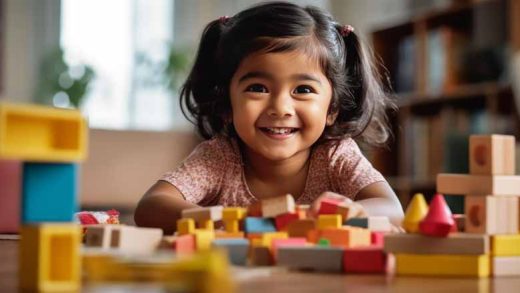Parents of young kids often sing the same songs, read the same books, and do the same routines. This is because toddlers like repetition. In fact, they seem to need it. Adults want new and different things, but kids enjoy repeated sounds, stories, routines, and actions. This frequent repetition can greatly impact how they learn and grow. Here are the key reasons why repetition helps children learn.
What is repetition?
In early childhood development, repetition is a fundamental learning principle that entails consistently practicing the same activities, actions, or knowledge. What is repetition all about? The process of repetition for children is dynamic. Youngsters are repeatedly exposed to certain things. This can be through actions, words, or routines. Repeating is more than just copying chores. It is a planned and intentional way to reinforce the importance of repetition in early childhood ideas in a child’s memory.
The repetition method is a good way to learn. It helps our brains make connections and grow. Repetition can happen in many ways. We use the same words a lot. We do the same thing every day. And we practice skills over and over. All of this repetition helps young minds understand the world around them.
Benefits of Repetition in Early Childhood
- Promotes Language Acquisition
- Offers Emotional Comfort
- Helps with Concept Acquisition
- Develop Essential Skills
- Helps to Build Social Skills
Children learn something new every time they hear the same story. Each time a child is exposed to a song, story, or action, they have the opportunity to learn even more about the subject at hand. Repetition in speech helps with language acquisition, particularly in infants. While you may find yourself singing the same songs or naming the same items again and again, each repetition reinforces the noun, verb, or adjective in your child’s memory. After several repetitions, kids will be able to sing, recite, or identify with you.
Language acquisition relies heavily on the repetition method. Hearing and practicing words often helps children’s vocabulary and understanding grow. This prepares them for better communication later. Repeating language also aids their grasp of grammar and sentence structure. This lays the foundation for them to communicate clearly and expressively.
Adults can adjust to changes in their routines. However, even small changes in a child’s schedule can affect their sleep, eating, and mood. Many parents think a daily routine gives their children stability and comfort. Children of all ages do well with a flexible yet structured timetable. One easy way is to find a caring, friendly place for everyday child care. When kids leave home each day, seeing a familiar spot and person can make them feel like they belong. A “home” away from home can give comfort and improve learning outcomes for very young children.
According to child psychologist Lev Vygotsky, as children learn a new skill, they enter a zone of proximal development (ZPD). As they interact with peers and caring adults who have mastered the skill, new learners can improve their comprehension of the topic. When a child practices a topic or skill enough times, they can master it. Children are developing a wide range of skills, including gross and fine motor skills, shifting from babbling to speaking to walking. Children’s skills in gestures, noises, and actions improve as they repeat them. This mastery generates feelings of exhilaration, pride, and competence.
Doing the same activities over and over helps kids learn the importance of repetition in early childhood. This includes language, motor skills, and problem-solving. Doing the same things consistently lets kids get better at these skills over time. For instance, practicing physical movements like crawling, walking, and grabbing things improves a child’s coordination.
Doing the same activities with friends helps kids grow socially. Shared routines make them feel like part of a group and work together. This teaches them how to connect with others positively. Skills like sharing, taking turns, and reading social cues are learned through repetition. These skills are important for building meaningful relationships later in life.
Repetition Activities in Influencing Behavioural Outcomes in Children
Turning a fun activity into a tool for managing conduct is a common practice in classrooms around the world. For example, you might sing a song to get your coats and boots on. Music is a powerful tool for building a repeatable activity pattern.
There are many ways to take advantage of these changes. You can structure activities, tell stories, play, etc. Each way has its place and benefits of repetition in early childhood. But you must consider them actively, not just use them. It should inspire them to copy. Early childhood educators and teachers must actively use musical patterns and repetition. This can improve learning for families.
There are numerous resources available for individuals who are interested. Finding the correct resources can be difficult. All you need is one helpful colleague or musician to begin a beautiful journey to help your child grow. The power of pattern and repetition through music is immense.
Kangaroo Kids International Preschool understands and promotes child development.
All of the activities that make up a child’s day at Kangaroo Kids are designed to broaden their knowledge and engage their minds. Our lead teachers understand how children develop. They promote learning using research-backed tactics such as intentional repetition and early exposure.
If you’re looking for a preschool, contact us today or visit our website to take a virtual tour of the Kangaroo Kids International Preschool.









